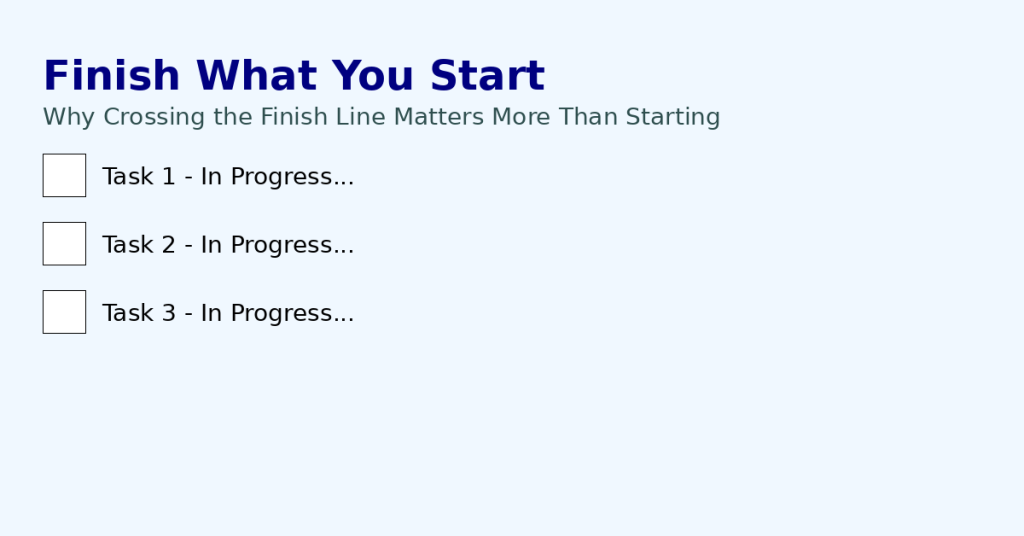We often begin projects with enthusiasm—but few of us cross the finish line. The psychology of finishing what you start explains why those final steps matter most. From neural triggers like dopamine surges to TikTok-fueled micro‑challenges, here’s what today’s science reveals about seeing things through.

Why the Last Step Weighs the Most
Zeigarnik & Ovsiankina: The unfinished-task tug-of-war
In the 1920s, psychologist Bluma Zeigarnik observed that waiters remembered interrupted orders vividly—but forgot completed ones. That nagging mental buzz is the Zeigarnik effect, where incomplete tasks remain in attention. Building on it, Maria Ovsiankina discovered that humans naturally feel compelled to return to interrupted tasks—the Ovsiankina effect.
Practically speaking:
- Unfinished tasks create mental tension.
- This tension can either motivate you—or nag you into procrastination.
Managing that tension is key to completion.
Why Completing a Task Feels So Good
Crossing the finish line releases a dopamine hit—the brain’s reward chemical. That chemical boost isn’t just a pat on the back—it’s hardwired motivation reinforcing productive behaviors.
- The sense of closure boosts self-confidence.
- Completed tasks reduce mental clutter and intrusive thoughts.
Burning Trends: Tiny Habits & Micro‑Bursts
The 2‑Minute & “1‑Minute” Rule
A recent wave of productivity experts, including James Clear and David Allen, recommend tackling tasks if they take two minutes or less—immediately. Completing little tasks right away builds momentum and makes finishing larger tasks feel easier.
Another emerging tip? The 60‑second rule: do any short chore—take out the trash, reply to a text—to keep clutter low and motivation high.
Scary Hour: TikTok’s 60‑Minute Focus Trend
On platforms like TikTok, the “Scary Hour” challenge has exploded: set a timer, tackle the most anxiety-inducing task daily. It works on time-limited dopamine spikes and the brain’s preference for finishing what’s begun.
Why We Procrastinate—and Don’t Finish
Three core reasons show up again and again:
- Self-regulation failure
Putting off tasks often signals deeper emotional and self-control struggles, like anxiety, perfectionism, or low self-esteem. - Complexity and overwhelm
When tasks feel too complex, mental fatigue kicks in and you stall. - Planning fallacy
We repeatedly underestimate how long work takes—a bias known as the planning fallacy.
A Guide to Actually Finishing What You Start
1. Break Big Tasks into 2‑Minute Micro‑tasks
Use the implementation intention strategy: “If X time arrives, I’ll do Y small task”. This taps powerful behavior-forming science.
2. Time‑Box High‑Anxiety Tasks
Adopt TikTok’s “Scary Hour”: pick your avoidance task, set a timer for 60 minutes, go. Repeat if needed, but aim for small wins.
3. Honour Momentum with Breaks
Task-switch breaks help—like choosing a photo for a blog post halfway through to reset focus.
4. Use Micro‑completions
Aim to finish mini-steps—even if the whole project isn’t done. They trigger dopamine and help close mental loops.
5. Build Templates & Routines
Routines reduce decision fatigue. Pre-planned processes around frequently left tasks smooth over initiation pain.
6. Visualise and Reward Completion
Define a clear finish line—e.g., “Write 300 words, then walk” or “Farm email replies, then coffee.” This reinforces reward pathways.
Hot Innovation: AI-Boosted Task Completion
Researchers are exploring how AI can help overcome that hesitation to finish. One 2023 study introduced AI‑agents that draft a task continuation (e.g. slide bullet points) to reduce the mental hurdle of continuation .
Imagine you stall mid‑essay—AI inserts your next paragraph as a prompt. That nudge could exploit the Zeigarnik Effect: once you see the work, you’re driven to complete it.
Final Thoughts: Finishing Is Where the Magic Happens
The last 10% of any task isn’t just an afterthought—it’s where closure, confidence, and momentum launch. Whether you’re cleaning out your inbox or coding a new feature, the psychology of finishing what you start reveals:
- Unfinished tasks hang over us (Zeigarnik).
- Completion rewards us (dopamine hits).
- Small steps and micro-habits win.
To finish more consistently: shrink challenges, respect your mental rhythms, use micro‑rewards, and even enlist AI nudges.
Because the real work isn’t beginning—it’s ending.
References
- Ness Labs (2022). The psychology of unfinished tasks: Zeigarnik & Ovsiankina effects. https://nesslabs.com/unfinished-tasks
- Verywell Mind (2024). Use the 2-Minute Rule to Beat Procrastination. https://www.verywellmind.com/use-the-2-minute-rule-to-beat-procrastination-8720928
- The Guardian (Nov 2024). ‘Scary hour’ TikTok trend as productivity hack. The Psychology of Finishing What You Start






